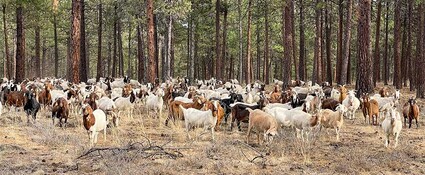Two hundred goats mow meadow in Sisters Country
Last updated 10/25/2022 at Noon

BILL BARTLETT
A couple hundred Boer goats have been chomping up weeds in the common area at Cascade Ranch.
It takes 200 goats 21 days to clear 50 acres of vegetation. This ancient form of mowing is having a resurgence, with a powerful demonstration right here in Sisters Country.
Homeowners in Cascade Meadow Ranch have hired Scott Martin to tackle weeds on a 50-acre portion of the Ranch’s 310 acres of common area.
The Ranch, with 24 two-acre lot homes, is surrounded by the Deschutes National Forest, giving homeowners lots of incentive to mitigate wildfire risk. Conventional tractors with mower attachments are not practical, unable to navigate easily among the ponderosa pines and other obstacles.
They turned to Martin from Terrebonne, who has a few hundred Boer goats. Boers typically weigh 130 to 140 pounds and stand about three feet high. They originated in South Africa, bred for meat. Highly resistant to disease, they adapt well to hot, dry semi-desert climates like ours in Central Oregon.
They are voracious grazers, and are not picky about their diet. They happily dine on juniper, sagebrush, blackberries, nettles, thistles, and even poison oak. Goats are also sure-footed, munching away in rocky and steep terrain.
They’re also quiet compared to mechanized mowing, and, as Martin said, “Goats are one of the most effective fire prevention tools available. Areas cleared or thinned by goats recover more naturally, and resist wildfires, giving fire crews the upper hand, and protecting life and property.”
He also let us know of the added benefit of the fields being mowed that are simultaneously being fertilized. “A win-win,” he chuckles.
According to Martin, goats are an environmentally friendly method for clearing areas containing endangered or sensitive vegetation and animal life. Thinning by goats is a natural method that results in a naturally balanced environment over the long term. Erosion from over-stripped, recently cleared land is eliminated safely and effectively.
The Cascade Meadow homeowners agree and are paying Martin north of $5,000 to tackle the 50-acre section.
The goats, all 200 and all nannies, were delivered in two double-decker stock trailers along with hundreds of feet of portable fencing and three pure white Great Pyrenees guard dogs to protect the goats. The American Kennel Club describes the breed as a large, thickly coated, and immensely powerful working dog bred to deter wolves and other predators on snowy mountaintops.
Pyrs are big, immensely strong mountain dogs standing as high as 32 inches at the shoulder and often tipping the scales at more than 100 pounds. These steadfast guardians usually exhibit a Zen-like calm, but they can quickly spring into action and move with grace and speed to meet a threat. The lush, weatherproof coat is all white, or white with markings of beautiful shades of gray, tan, reddish-brown, or badger.
To manage the goats and the dogs, Martin supplies a goat herder who lodges in a nearby RV. He’s aided by a four-wheel ranch utility vehicle the herder uses to set fences and supply water to the herd.
Try finding a goat herder in Oregon. You won’t. Martin has to import them from Peru. They come on an H-2A temporary agricultural visa and stay for three years. Peru is legendary for goat herders.
The herder sets up the solar-powered electrified fencing in two- to three-acre patches and herds the goats inside. From there nature takes its course. After the goats clear the section, the fence is moved and the process repeated under the watchful eyes of the Pyrs. Even with fencing, coyotes, plentiful at the ranch, would menace the goats unless the dogs were on hand.
Male goats are precluded from the mix for the obvious reason — unwanted breeding. And they are known to be occasionally uncooperative. Just ask Rand Rietmann of Cloverdale, who recently borrowed his neighbor’s billy to clear some vegetation.
The goat, tethered to a tree with a long rope so it could work sections, got his rope tangled with his water dish. Rietmann, in trying to free the rope, found himself on the ground, butted hard by the goat.
Some of Martin’s goats are fitted with bells, making it easier for the herder to find them, and in the unlikely event that they escaped their fencing, one has a GPS tracker. Being herd animals they would of course all be bunched together.
Jane Stayer, one of the homeowners involved in finding Martin, took us on a tour where we met the goats and saw first-hand evidence of their handiwork.
“We are very pleased with the outcome so far,” she said. “It’s actually a very cost-effective way to mitigate the fire danger.”
She imagines the goats returning next year.
The goats will be finished with their job next week, and Martin will move them to their next contract.












Reader Comments(0)